)_tankless.jpg?cx=1265&cy=0&cw=468&ch=625)
Tankless Water Heaters: How Do They Work?
Table of Contents
- What's a Tankless Water Heater?
- Difference Between Tankless Electric and Tankless Gas
- How Do Tankless Water Heaters Work?
- Advantages & Disadvantages of Tankless Water Heaters
- How to Choose the Right Water Heater for Your Needs
- Problems With Your Tankless Water Heater
- Learn More About Tankless Water Heaters
Modern home appliances have seen significant innovation throughout the years, and tankless water heaters serve as an example in that regard. But just how do tankless water heaters work? Built with residential water heating needs in mind, they combine efficiency with a space-saving design that makes them simple to place, install, and deploy in smaller areas. Their on-demand engineering eliminates the need for bulky storage tanks, providing hot water instantly when you need it via advanced heating elements.
Read on to learn all about how these modern marvels work, how they compare to traditional water heaters and the pros and cons of using a tankless water heater in your home.
What's a Tankless Water Heater?
Also known as an on-demand water heater, tankless water heaters revolutionize hot water delivery by heating water instantly as it flows through the unit. Unlike traditional water heaters, tankless systems have no storage tank, so they don't have to refill between showers, baths or use of household appliances. This instantaneous service also helps with energy savings because tankless water heaters don't heat water until you need it.
Traditional Water Heaters vs. Tankless Water Heaters
Whether you're weighing water heater options for a new home construction or you've found out the answer to "how long do water heaters last?" and need a new one, it's helpful to compare traditional water heaters and tankless water heaters to decide what works best for you. Your choice impacts a variety of things around your home, including energy-efficiency levels that affect utility costs and daily comfort levels that rise when you have all the hot water you need. And though traditional water heaters have proven themselves reliable necessities in modern homes, tankless water heaters may just have them beat with their innovative technology — or they may not, depending on your personal preferences and needs. Let's explore the nuances between these two types of systems so you can get a better bead on what works for you.
Traditional Water Heaters
Built to store hot water in a tank, traditional water heaters typically have tanks sized 20 to 80 gallons, making them appropriate for small and large homes alike. These tanks heat and maintain stored water continuously, so it's always ready when you turn on your hot water tap or operate appliances with direct water heater hookups. Without proper insulation around the tank, however, the potential for heat loss through the tank's walls exists, which may lead to increased consumption of electricity or gas.
Likewise, once you deplete the hot water tank, you may experience considerable delays before you have hot water flowing freely again. This wait time occurs because the tank reheats the water to the temperature you have set, making traditional water heaters potentially inconvenient if you use lots of hot water during certain periods or have a larger household.
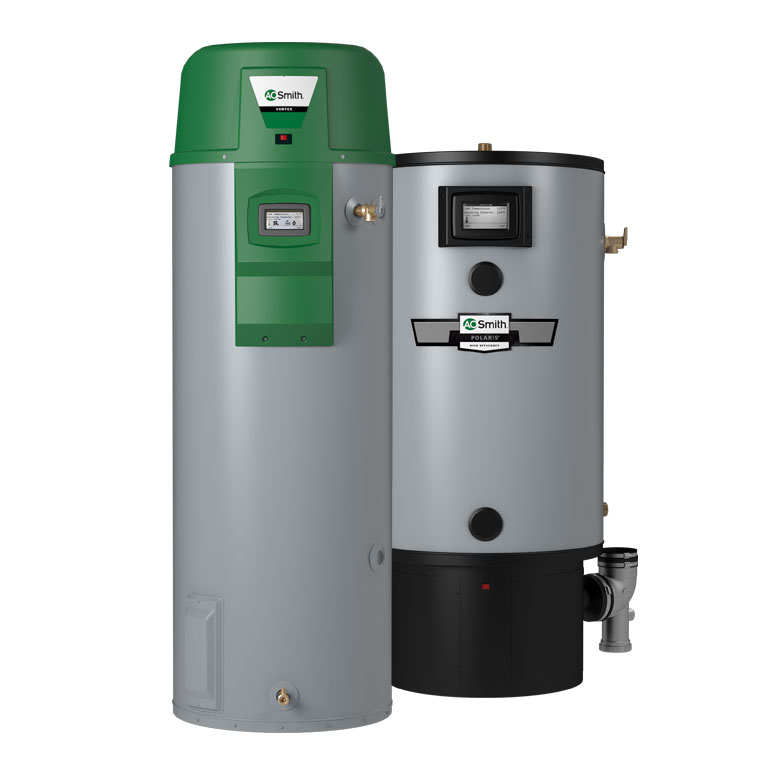
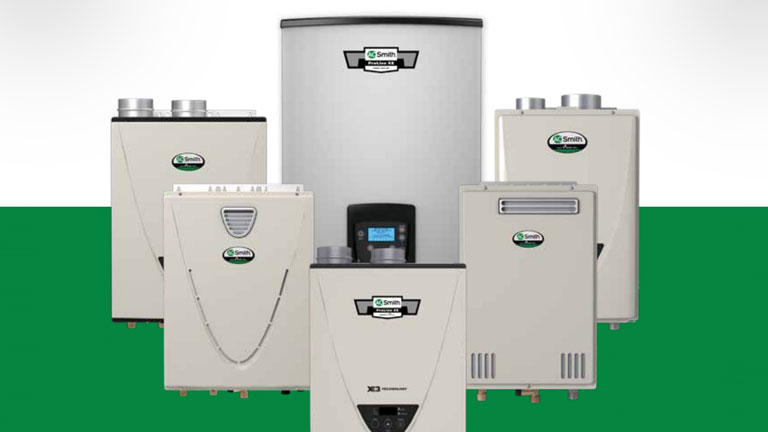
Tankless Water Heaters
In contrast to traditional systems, tankless water heaters don't rely on storage tanks to deliver hot water to your home. Rather, these units heat water on demand by passing it over the unit's heating elements. The on-demand nature of the water heating tankless units means you don't need a large tank to provide the same amount of hot water, so you don't need as large a space for water heater installation. The space-saving nature of the design makes tankless water heaters imminently well-suited to smaller homes and apartments that need all the extra space they can get for household storage.
Further, no storage tank means you don't incur energy-wasting heat loss when you use a tankless water heater. This increased energy efficiency may potentially lower your energy bills, all while still ensuring you have the hot water you need — instantly — and that you don't run out mid-shower due to an empty tank.
Differences Between Gas and Electric Water Heaters
Discerning the difference between tankless electric and tankless gas water heaters helps you better select the system you need for your home. Let's take a look at what sets each type of unit apart from the other and what that means for your household.
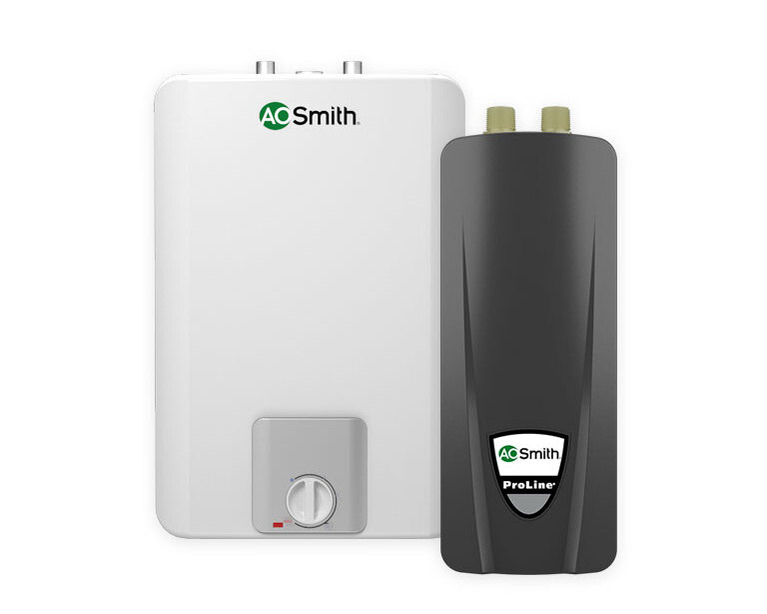
Electric Tankless Water Heaters
How do electric tankless water heaters work? First, these units utilize an electrical heating element inside their construction that heats water as it flows through the tankless water heater. Known for their ease of installation and lower up-front cost when compared to tankless gas water heaters, these units work best for homes with a reliable source of electrical power. Electric tankless water heaters also offer a more eco-friendly design than their gas counterparts, thanks to components that don't produce greenhouse gas emissions during operation.
Gas Tankless Water Heaters
Instead of electrically powered heating elements heating water like in electric units, gas tankless water heaters utilize natural gas or propane to complete the heating process as water passes through. A gas burner ignites and heats the water for an on-demand supply, and their high heating capacity makes them a popular choice in homes that already use this type of power source. For this reason, larger households may prefer a gas tankless water heater, even with their higher initial costs.
These upfront differences in pricing are compounded by the need for professional installation of gas tankless water heaters, but they're also often offset due to overall energy efficiency, making these units more cost-effective in the long run, especially in areas with affordable natural gas. One downside of these units is that they do produce emissions during operation, making them less environmentally friendly and requiring proper ventilation to protect indoor air quality.
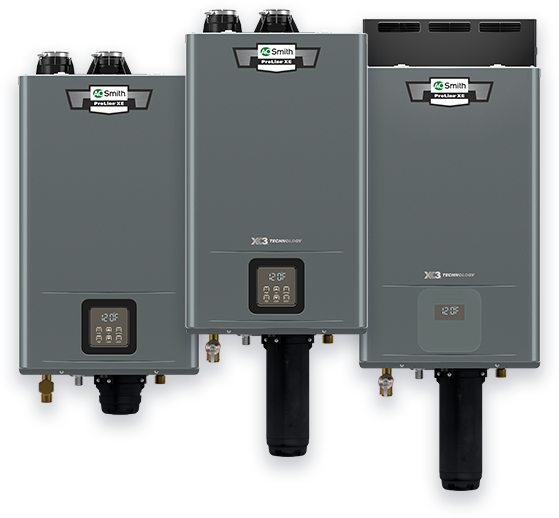
How Do Tankless Water Heaters Work?
Tankless water heater systems use a series of processes to transform cold water entering on one end into hot water as it exits the other. Use this comprehensive breakdown to understand how each operation contributes to the functionality of these modern water heating units.
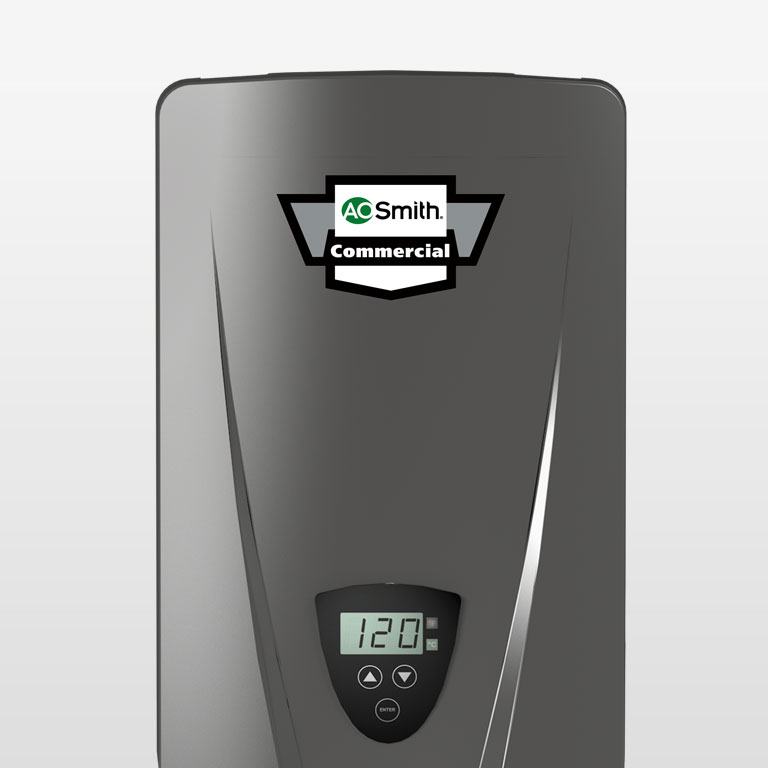
Electric Tankless Water Heater
Powered by electricity, these tankless water heaters bypass the limitations of storage tanks and eliminate the need for preheating water, ensuring on-demand access in your home. These units perform these tasks through a series of events, and below, we explain each part of that process.
Activating the Heating Process
When you turn on a hot water tap in your home, cold water enters your tankless water heater through your pipes and plumbing system. A network of thermistors within the unit then detects the flow of water, triggering the heating elements to activate the heating process.
Elevating Water Temperatures
Once within the tankless water heater, cold water enters a chamber with the electric heating elements. The water flows through this portion of the unit, and as it does, the heating elements rapidly elevate the water temperature.
Sensing the Water Temperature
As the heating elements and water interact, a temperature sensor constantly monitors the temperature. Precision monitoring during this step helps optimize heating control over the water, preventing potentially dangerous overheating and delivering consistent supplies of hot water.
Providing Hot Water Via Taps
Water exits the tankless water heater through dedicated hot water outlets once it reaches the set temperature. This energy-efficient process enables seamless hot water delivery for a more comfortable, convenient household.
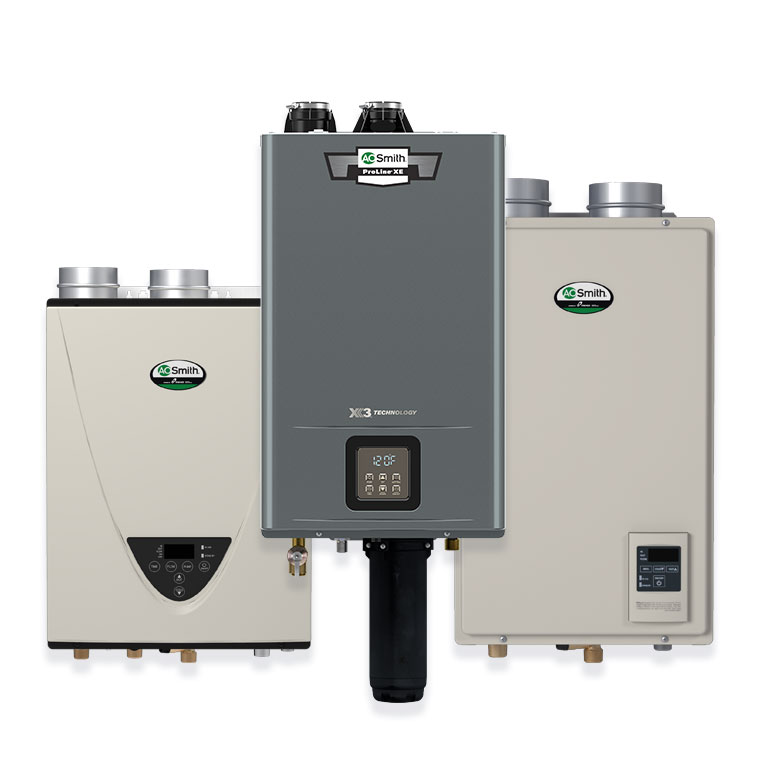
Gas Tankless Water Heater
Powered by propane or natural gas, these tankless water heaters offer an innovative way to heat water in homes with existing gas lines. Like their electric counterparts, these units deliver on-demand hot water with energy efficiency, albeit with more emissions. Let's look at how gas tankless water heaters get the job done.
Activating the Gas Burner
When the flow sensor within a gas tankless water heater detects water movement from an open tap, it prompts ignition of the gas burner. The gas burner, in turn, heats the heat exchanger, a core component within these tankless water heater systems.
Circulating Water in the Unit
Water now entering the gas tankless water heater flows around the heat exchanger, which receives the heat it needs via the gas burner. This energy-efficient process enables swift heating and uniform water temperatures.
Delivering Heated Water
When the water inside the tankless unit reaches the right temperature, it exits through the pipes and out the tap. This highly convenient design guarantees you get the immediate water you need for your fixtures and appliances, eliminating the wait and reducing wasted energy.
Venting Combustion Gasses
Sealed vents safely expel combustion gasses that form during the water heating process, ensuring safe, environmentally responsible operation. This final part of the water heating process helps you maintain excellent indoor air quality and comply with safety standards.
Advantages & Disadvantages (Pros & Cons) of Tankless Water Heaters
The debate between an electric water heater vs. gas models often begins and ends with existing energy infrastructure in your home. If your home already has a gas line, getting a gas water heater may be a no-brainer — homes with an established gas supply typically find these options more convenient and cost-effective. Likewise, if your home only has electric energy infrastructure, an electric water heater serves as a straightforward solution that requires no additional setup.

Advantages of Tankless Water Heaters
Transitioning from a traditional tank water heater to a tankless unit confers several key benefits that can help you save money and make your home more eco-friendly.
Enhanced Efficiency
The time-saving convenience of on-demand hot water is one of the main benefits of installing a tankless water heater. Eliminating the need to store and continuously heat a large water tank also reduces energy demands within your home, potentially decreasing electricity or natural gas costs. This lowered consumption also makes your home more eco-friendly because you're not using all that energy to store and heat water all the time.
Space-Saving Design
No tank to heat water and store it doesn't just reduce energy consumption — it also saves valuable space within your home. These compact units eschew the bulky tanks of their traditional counterparts with streamlined designs that mount on your wall, tuck away in a closet or enable installation in other out-of-the-way areas where large tanks just can't go.
Longer Lifespans
Another benefit of tankless water heaters is they usually have a longer lifespan than traditional units. While tank water heaters may provide 10 to 15 years of service, many tankless options ensure 20-plus years of use when properly maintained. This longer service life, when combined with other cost-saving benefits, may add to decreased water heating costs over the long term, even if tankless units have higher up-front price tags.
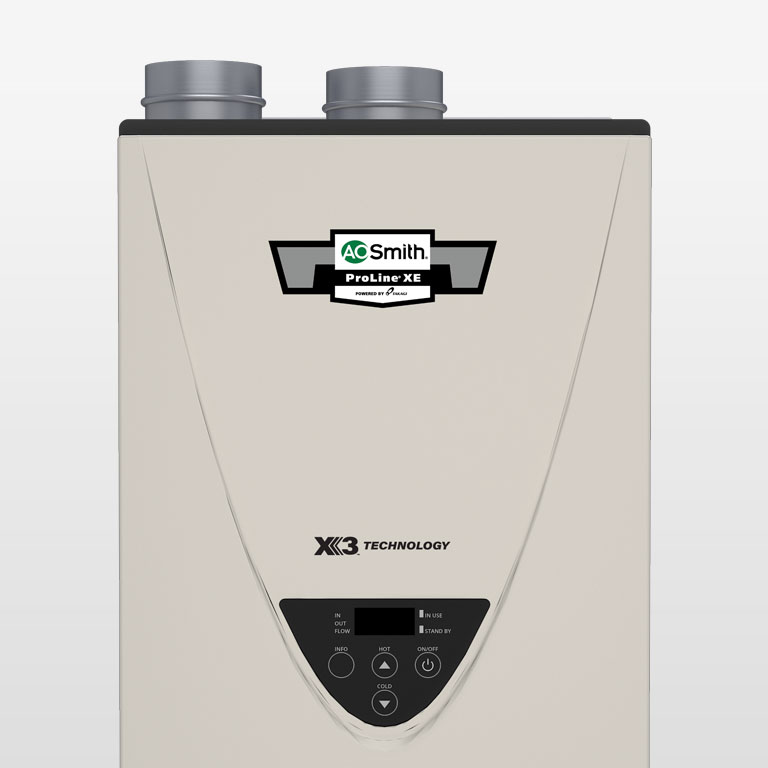
Disadvantages of Tankless Water Heaters
Tankless water heaters doubtlessly provide numerous advantages to homeowners, but they do have some drawbacks to consider before picking a unit. Understand these limitations before you invest in a tankless unit in case a traditional water heater may be more of what you need.
Simultaneous Usage Issues
While tankless water heaters deliver on-demand hot water, they're typically more effective when delivering it to a single place. For example, if you're taking a shower while your spouse uses the washing machine, tankless units may struggle, or even fail, to deliver adequate supplies for simultaneous usage. These limitations may make tankless water heaters less viable options for homes with high hot water demands.
Special Installation Requirements
Electric tankless water heaters require specific electrical setups that may require professional installation. Strong dedicated circuits for these models work best because they have a high power demand when they're heating water in real-time for your showers, sinks and appliances. This requirement may add up to extra costs, especially in older homes that need an electrical upgrade anyway.
Higher Upfront Costs
Though tankless water heaters typically have a longer service life than their traditional counterparts, this potential savings comes at a higher upfront price for the unit itself. Tankless water heaters typically cost more, and they may mean you need to update or modify existing power systems in your home to accommodate their enhanced energy load.
How to Choose the Right Water Heater for Your Needs
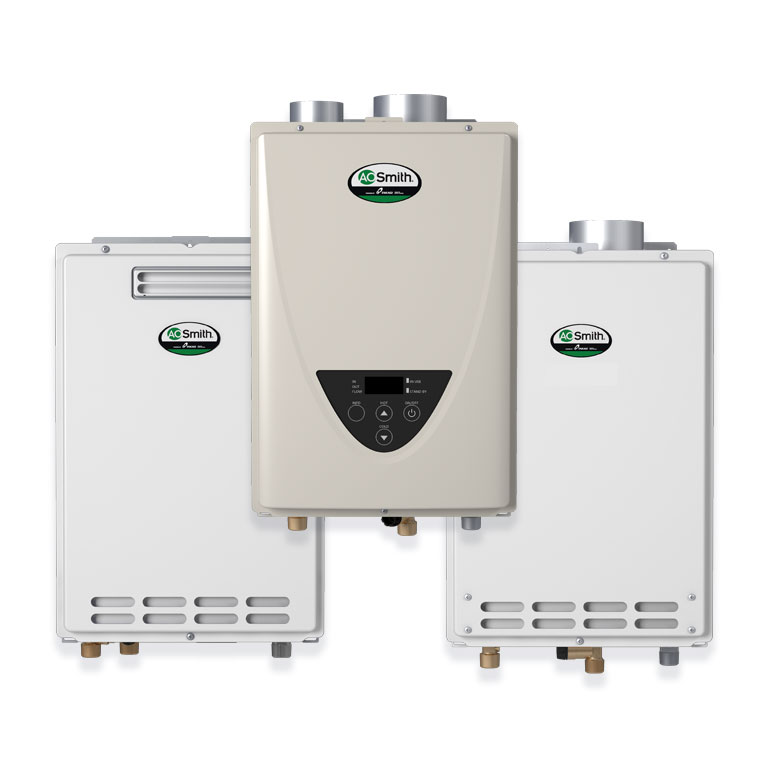
When you're choosing a water heater, be sure to factor in the needs of your household, including how many people live there and how much hot water you typically use. Fortunately, A. O. Smith's water heater selector tool helps you determine the right appliance for your needs, and we offer excellent support services when you need to talk to a representative about what's the best choice for your household.
Problems With Your Tankless Water Heater
If you're encountering issues with your tankless water heater, A. O. Smith can help with support resources that help you troubleshoot problems. Our representatives are always at the ready when you need them as well, giving you quick answers to pressing questions and helping you navigate the repair or replacement process.
Learn More About Tankless Water Heaters
Modern innovation has brought the size down and functionality up when it comes to water heaters, making tankless units a go-to solution when you need on-demand hot water in a compact design you can install practically anywhere. With that in mind, learn more about what may work best for you by exploring the ins-and-outs of gas and electric tankless water heater designs.
Gas Tankless Water Heaters
Though gas tankless water heaters may have a higher upfront cost, these units make a great choice for larger households. They provide on-demand hot water in an energy-efficient way to save you money on energy costs down the road.
Electric Tankless Water Heaters
When you want lower initial costs paired with energy efficiency, electric tankless water heaters may be your best bet. These units offer easy installation with no need for gas lines or ventilation, making them a cost-effective water heating solution.